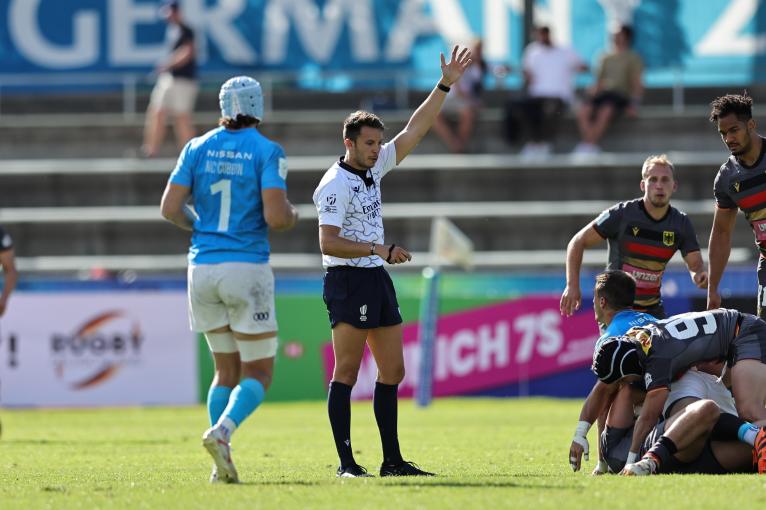L’arbitre basque Evan Urruzmendi convoqué sur le SVNS

World Rugby a confirmé les 35 officiels de match composant les panels masculin et féminin pour le HSBC SVNS 2025 et le World Rugby HSBC Sevens Challenger 2025.
Douze fédérations sont représentées parmi les 17 officiels nommés dans les panels du SVNS 2025, dont un peu plus de la moitié se trouvait déjà dans le groupe 2024 et rejoignent ainsi les nouveaux venus dans les équipes d’arbitres haute performance du 7.
L’un d’entre eux va faire ses débuts cette année sur le circuit mondial, le Basque Evan Urruzmendi. À seulement 28 ans, le natif de Saint-Jean-de-Luz s’est imposé comme l’un des jeunes arbitres les plus prometteurs de France. Il avait déjà officié sur le World Rugby HSBC Sevens Challenger au cours de l’année dernière.
Les débuts : joueur puis arbitre à 15 ans
C’est à l’âge de 5 ans qu’Evan découvre le rugby en intégrant l’école de rugby locale, mais c’est à 15 ans que son parcours prend une tournure inattendue. En plus de jouer, il commence à arbitrer sur les terrains lors des tournois de jeunes, souvent désigné pour tenir le sifflet lorsque personne d’autre ne se proposait.
« En minimes, en plus d’être joueur, il fallait désigner un arbitre sur les plateaux. Ça tombait souvent sur moi… Peut-être parce que je n’étais pas l’élément clé de l’équipe… », plaisantait-il auprès de la Ligue régionale Nouvelle-Aquitaine.
À 15 ans, il intègre ce centre de formation et se consacre alors pleinement à cette nouvelle voie. À partir de ce moment-là, Evan n’a cessé de gravir les échelons. Après avoir arbitré en tant que cadet et junior, il commence à officier sur des matchs en séries régionales dès l’âge de 18 ans.
Un véritable choc pour lui, non seulement en termes de niveau de jeu, mais aussi dans la gestion des matchs et des hommes. En parallèle de ses études de commerce dans le domaine sportif, il passe le concours du jeune arbitre fédéral, ouvrant la voie à une progression rapide.
Il passe en six ans de la Fédérale 3 à la Pro D2
À 20 ans, il est déjà classé en Fédérale 3, puis accède à la Fédérale 2 dès l’année suivante. Pendant trois saisons, il se forge dans cette division, à la croisée du rugby amateur et élite, avant de faire son entrée en Fédérale 1. Le Covid-19 interrompt cette progression fulgurante.

À 26 ans, la consécration arrive : Evan est promu en Pro D2, l’antichambre du Top 14, tout en étant régulièrement désigné assistant en Top 14 et même pour des rencontres de Coupe d’Europe.
Mais le moment marquant de cette ascension fulgurante est survenu au printemps 2024, lorsque Evan a arbitré son premier match international. Ce fut lors du Tournoi des Six Nations U20, où il a dirigé la rencontre Italie-Angleterre.
Expérience internationale
Depuis, on ne l’arrête plus. En début d’année, il était assistant en Champions Cup et Challenge Cup en Afrique du Sud avec trois autres français : Luc Ramos, Jérémy Rozier et Patrick Dellac.
« C’est le souvenir de stades de près de 80 000 places, mais aussi, la découverte d’un nouveau pays, de nouveaux paysages, d’une faune incroyable », s’émerveille-t-il.
Deux ans après ses débuts en Pro D2, Evan a fait ses premiers pas en Top 14 en septembre pour le Toulon-Castres à Mayol. Un gros morceau pour commencer.
« J’ai 28 ans, effectivement, c’est un parcours relativement rapide quand on sait qu’en France, on commence au niveau régional et que l’on ne peut monter que d’une division, chaque saison », confiait-il alors à France Bleu Pays Basque.
Oscillant entre Top 14 et Pro D2, c’est lui aussi qui a officié sur le Provence-Brive qui avait vu les retrouvailles de Courtney Lawes et Jules Plisson à la mi-octobre.






























